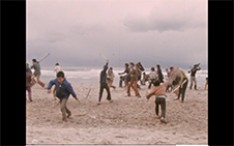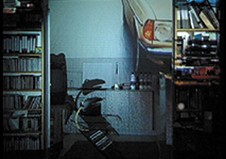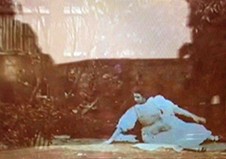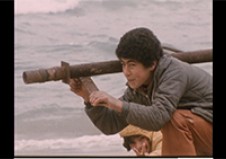minutes, hours, days

Children of War (Les Enfants de la guerre), by Jocelyne Saab ©Jocelyne Saab’s Friend Association / Nessim Ricardou-Saab
Available online worldwide!
Saturday, August 21–Monday, August 23, 2021
Online, hosted by Los Angeles Filmforum
Conversation: August 22, 2021 at 8pm PDT
In person via Eventive or Zoom: Filmmaker Rania Stephan in conversation with Guest Programmer Zaina Bseiso, viewable on Eventive or Zoom.
INFO: https://watch.eventive.org/minuteshoursdays/play/6114b102e4667500b600190c
323-377-7238
Presenting Partner: Video Data Bank
This month marks one year since the Beirut port explosion. On August 4th, 2021, people took to the streets to mourn, remember and grieve collectively; only to be met with tear gas and unsolicited violence. Events repeat themselves and the cycle of corruption and neglect continues without a trace of accountability. Past, present and future are in constant collision—in Lebanon as in the films—as a result of consistently unresolved needs. This program lingers on the repetition of events and celebrates Lebanese filmmakers who poetically engage with the weighty task of remembrance. Their work counters violence with images of power, desire and unfolded memories. A Film Noir-like investigation, recollections of a city increasingly estranged to its own people and children’s drawings that complicate the relationship between reality and fiction ultimately point at Rania Stephan’s question: “What remains of war, death and love with the passing of time?” —Zaina Bseiso
Tickets: Sliding Scale, as you can pay, recommended $12 general, $8 students.seniors, $0 for Filmforum members at https://watch.eventive.org/minuteshoursdays/play/6114b102e4667500b600190c
For more information: www.lafilmforum.org or 323-377-7238.

Red Chewing Gum, Image copyright of Akram Zaatari, courtesy of Video Data Bank at School of the Art Institute of Chicago.
Red Chewing Gum
by Akram Zaatari (Lebanon, 2000, video color, sound, 11’)
Courtesy Video Data Bank at the School of the Art Institute of Chicago
A video letter that tells a story of separation between two men, set within the context of the changing Hamra, a formerly booming commercial center. The video looks at image making in relation to consumption and the possession of desired subjects. It examines issues of desire and power, and the attempt to capture fleeting time.
Akram Zaatari is a filmmaker, photographer, archival artist and curator. He co-founded the Arab Image Foundation with photographers Fouad Elkoury, and Samer Mohdad. Akram has been exploring issues pertinent to post-war Lebanon. He investigates the way television mediates territorial conflicts and wars, and is particularly interested in logic of religious and national resistance movements, and the circulation and production of images in the context of today’s geographic division in the Middle East. His work has been widely exhibited worldwide in biennales and venues such as the Centre Pompidou and is in the permanent collection of museums such as Tate Modern. and the Thyssen Bornemisza Contemporary. Akram was selected to represent Lebanon at the 2013 Venice Biennale by Sam Bardaouil and Till Fellrath, curators for the Lebanese Pavilion.

Memories for a Private Eye, image Courtesy of Rania Stephan
Memories for a Private Eye
By Rania Stephan (Lebanon, 2015, video, color, sound, 31’)
The first chapter in a trilogy which investigates the filmmaker’s personal archive. Evoking the language of film noir, it foregrounds the fictional detective Marc McPhearson from the film Laura (1943) by Otto Preminger, to help unfold deep and traumatic memories. The film spirals around a lost image: the only moving image of the filmmaker’s dead mother. How is absence lived? What remains of war, death and love with the passing of time? These are the questions that are delicately displayed for contemplation. While dwelling onto the past, the film weaves together images from different sources – private archives, cinema, television, YouTube – unfolding into a labyrinthic maze, to create a blueprint of remembrance itself.
Born in Beirut, Rania Stephan is an artist and filmmaker working with still and moving images. She has directed art videos and creative documentaries. Her documentaries give a personal and poetic perspective to political events. Archival material has been an underlying enquiry in her artistic work. Her most recent work investigates forgotten images and sounds that haunt the present. By juxtaposing them with new ones, she explores a diversity of meanings, triggering renewed narratives and emotions. Approaching images like an editor – part detective, part cinephile, she traces absence and remembrance originary to those images.

Children of War (Les Enfants de la guerre), ©Jocelyne Saab’s Friend Association / Nessim Ricardou-Saab
Children of War (Les Enfants de la guerre)
By Jocelyn Saab (Lebanon, 1976, 16mm transferred t0 digital, color & b/w, sound, 12’)
Days after the Karantina massacre in a predominantly Muslim shanty town in Beirut, Jocelyne Saab met children who’d escaped, and who were deeply traumatised by the horrific fighting they’d seen with their own eyes. She gave them crayons and encouraged them to draw while her camera filmed. She made a bitter discovery: the only games the children engaged in were war games, and the war would quickly become a way of life for them as well.
Jocelyne Saab is a filmmaker and a photographer. She was born in 1948 and grew up in Beirut. In 1973, she became a war reporter in the Middle-East. In 1975 she directed her first documentary, Lebanon in Turmoil. She then covered the Lebanese war for fifteen years, during which she directed almost thirty films, including Beirut, never again, Letter from Beirut and Beirut, my city. She was awarded the Order of Chevaliers des Arts et des Lettres for Once Upon a Time, Beirut. Throughout her life, she organized a number of important events including rebuilding the Lebanese Cinematheque.
